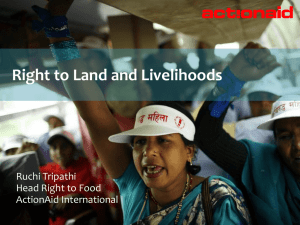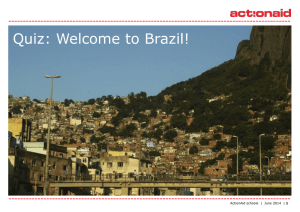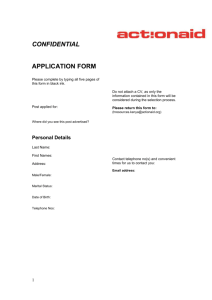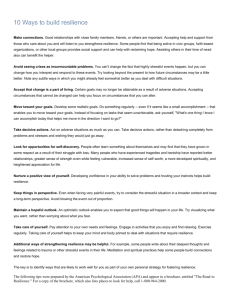Terms of Reference Urban Resilience Researcher 120 days
advertisement
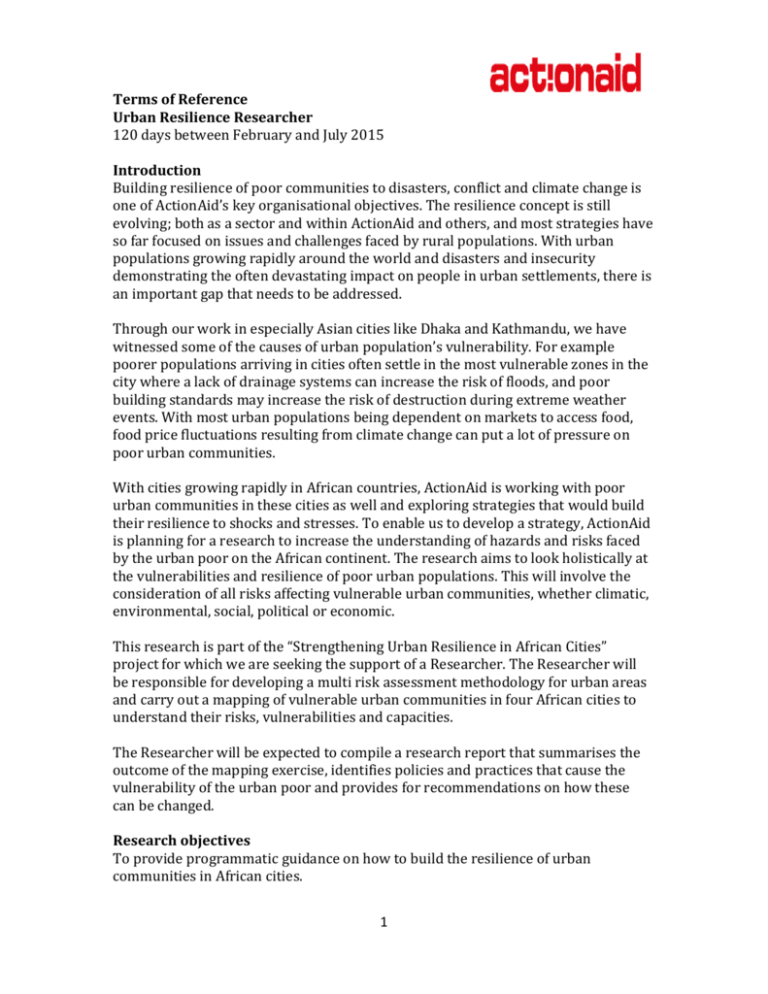
Terms of Reference Urban Resilience Researcher 120 days between February and July 2015 Introduction Building resilience of poor communities to disasters, conflict and climate change is one of ActionAid’s key organisational objectives. The resilience concept is still evolving; both as a sector and within ActionAid and others, and most strategies have so far focused on issues and challenges faced by rural populations. With urban populations growing rapidly around the world and disasters and insecurity demonstrating the often devastating impact on people in urban settlements, there is an important gap that needs to be addressed. Through our work in especially Asian cities like Dhaka and Kathmandu, we have witnessed some of the causes of urban population’s vulnerability. For example poorer populations arriving in cities often settle in the most vulnerable zones in the city where a lack of drainage systems can increase the risk of floods, and poor building standards may increase the risk of destruction during extreme weather events. With most urban populations being dependent on markets to access food, food price fluctuations resulting from climate change can put a lot of pressure on poor urban communities. With cities growing rapidly in African countries, ActionAid is working with poor urban communities in these cities as well and exploring strategies that would build their resilience to shocks and stresses. To enable us to develop a strategy, ActionAid is planning for a research to increase the understanding of hazards and risks faced by the urban poor on the African continent. The research aims to look holistically at the vulnerabilities and resilience of poor urban populations. This will involve the consideration of all risks affecting vulnerable urban communities, whether climatic, environmental, social, political or economic. This research is part of the “Strengthening Urban Resilience in African Cities” project for which we are seeking the support of a Researcher. The Researcher will be responsible for developing a multi risk assessment methodology for urban areas and carry out a mapping of vulnerable urban communities in four African cities to understand their risks, vulnerabilities and capacities. The Researcher will be expected to compile a research report that summarises the outcome of the mapping exercise, identifies policies and practices that cause the vulnerability of the urban poor and provides for recommendations on how these can be changed. Research objectives To provide programmatic guidance on how to build the resilience of urban communities in African cities. 1 Specific objectives: 1. To develop a multi-risk assessment methodology that uses community participation and scientific sources to measure urban resilience. 2. To understand the risks urban communities experience by conducting a multirisk assessment with urban poor communities in four African cities. 3. To understand the practices and national strategies that undermine the resilience of urban communities in African cities. 4. To work with all four country offices to develop a well-informed strategy including programme and policy advocacy activities to build the resilience of poor urban communities in African cities. Research question The central research question is: How can the resilience of the urban poor in African cities be strengthened to shocks and stresses? Tasks The Researcher will be managed by ActionAid’s Project Manager –Resilience. The Researcher’s core tasks include: 1. Collect secondary data on urban resilience and measuring resilience through desk research. 2. Field research with poor urban communities in four African cities with the support of the respective ActionAid country offices: a. Do scoping work of communities vulnerable to shocks and stresses like disasters, health emergencies and conflict. b. Carry out social mapping of vulnerable communities to understand their challenges and concerns, impacts of shocks and stresses, capacities to cope, and what can be done to strengthen their capacity. c. Identify practices and national strategies and policies that cause vulnerability for poor communities in urban areas and what needs to be changed. 3. Produce a generic framework on urban resilience based on the four country studies. 4. Develop country specific (four in total) urban resilience programme guidance that can form the basis for funding proposals. 5. Compile a research report including recommendations on pro urban resilience policies and practices. Deliverables 1. Generic framework on urban resilience in Africa. 2. Concise actionable report that includes programme guidance for ActionAid offices in Africa (including annotated bibliography of external documents consulted). 3. Summary notes of interviews and focus group discussions. 4. Present the main findings of the research including recommendations to ActionAid staff. A PowerPoint presentation will be shared with ActionAid. 2 Style of report The actionable report needs to be of sufficient high quality and of relevance to both an internal and external audience of development partners and government authorities. The report should include an executive summary and should not exceed a maximum of 25 pages, excluding annexes. In order to use the research findings, ActionAid must be provided with full information and documentation of the sources used so that ActionAid could substantiate those findings herself. Therefore ActionAid requires an annotated bibliography of external documents consulted and notes of interviews and focus group discussions conducted. Use of report The report should come up with clear programme guidance at practice and policy level for ActionAid offices. ActionAid and other relevant development partners need to be able to make decisions concerning the organisation’s urban resilience strategy on the basis of the programme guidance recommendations. Depending on the outcome of the research there may be an opportunity for the Researcher to transform the research report into in an official ActionAid publication after the assignment. Duration and international travels The Researcher will be expected to conduct the research and complete the research report during a 120 day engagement between February and July 2015. The Researcher will be required to travel to a maximum of four African cities for field research. The costs for transport, accommodation and meals of these travels will be covered by ActionAid. The Researcher will receive logistical support from the local ActionAid office during the field research. In the event of unforeseen changes and a need to increase the number of days, this shall be agreed upon by ActionAid and the Researcher. The Researcher will be contracted as a consultant. Hence the Researcher is expected to have access to his/her own laptop. The Researcher will be home based with occasional visits to the ActionAid office in London (if researcher is based in the UK) and the international travels. The Researcher shall carry out the tasks and specific activities outlined in this terms of reference to deliver the specific expected output professionally, responsibly and sensitively. ActionAid will pay the Researcher a fee of £75 per day (please note that that this is the rate for a UK based researcher; if the researcher is located elsewhere, the fee will be brought in line with the local cost of living) and all other costs outlined in the 3 contract upon timely submission and acceptance of a 1st draft report (40% payment), and final research report (60% payment). Person specification Essential Education & certifications Master degree in a multidisciplinary study such as development studies, urban planning, sociology, environmental or conflict studies (candidates with a Bachelor degree will only be considered in case their research experience relates closely to this project). Knowledge & Experience Technical expertise in a field related to Disaster Risk Reduction (DRR), resilience, urbanisation, and/or climate change. Demonstrated experience with qualitative socio-economic research and analysis. Ability to conceptualise and understand new subjects outside the formal education and working experience. Strong analytical, report writing, and presentation skills (in English), including the ability to present complex issues clearly and concisely. Excellent problem-solving skills and resourcefulness. Knowledge of relevant Microsoft office software. Experience working in a developing country. Available for travels to a maximum of four African cities for a duration of 1-3 weeks each and flexibility in this. Desirable Experience working with an international agency. Experience working in African contexts. Experience with participatory research in a developing country. Deadline Suitable candidates are invited to send their CV and a cover letter to Jessica Hartog (jessica.hartog@actionaid.org). The deadline for applications is 12 February 2015. However, we are seeking to fill this vacancy as soon as possible and will review applications as they come in. 4
